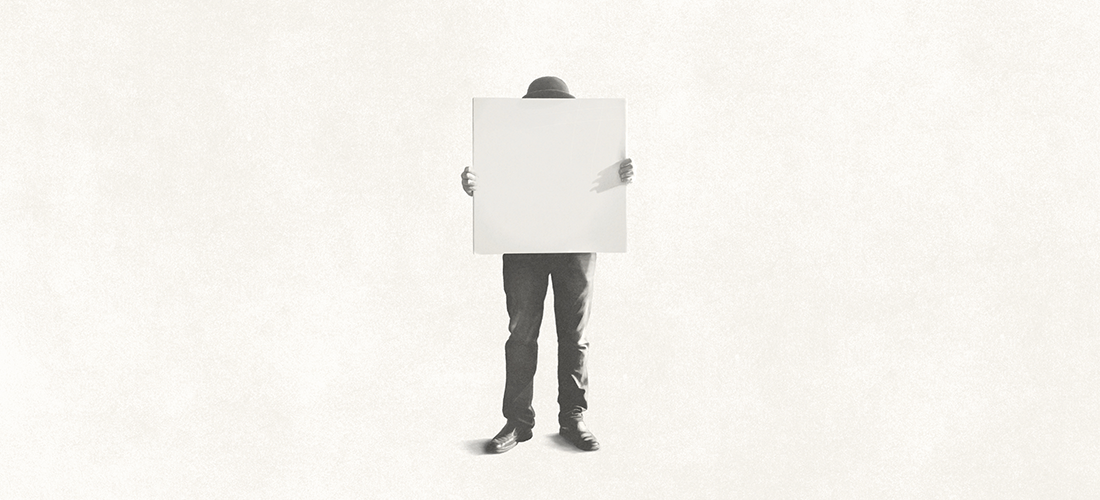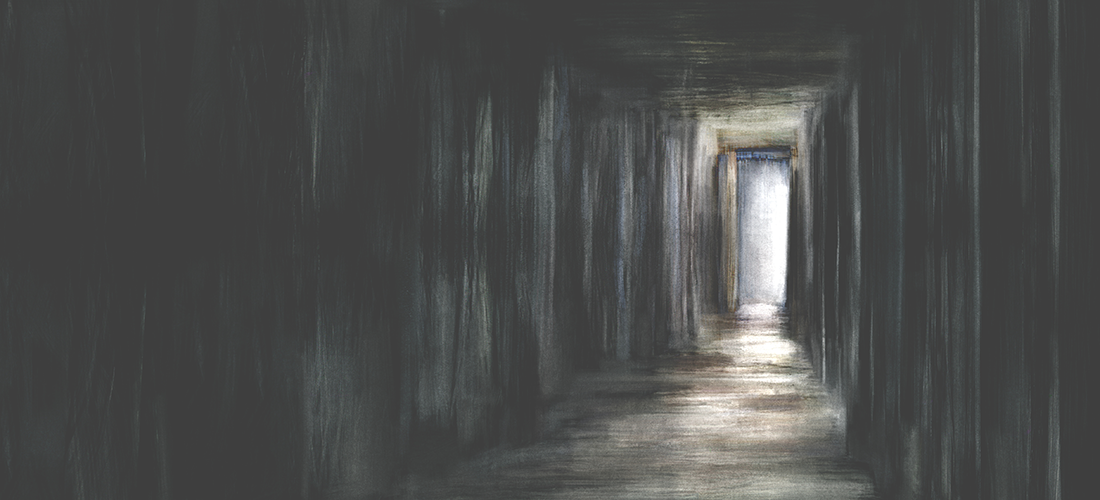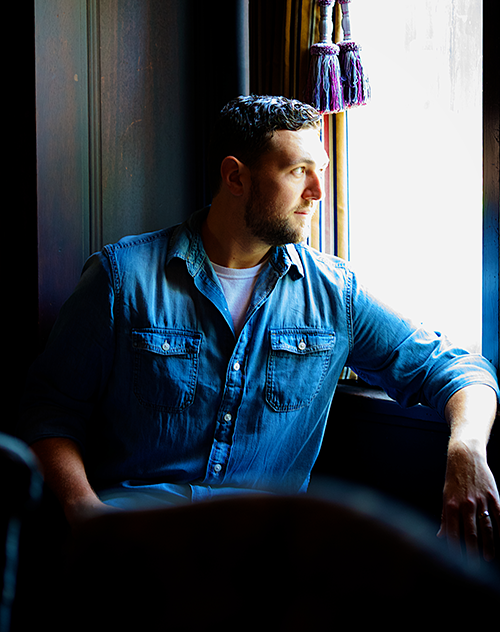
“I can’t do it, Daniela. It runs contrary to everything we raised him to believe.”
“Pero es nuestro hijito, Pasha,” his wife sobbed.
“And he always will be our son—never a question there. But that doesn’t mean we have to support …” His voice dropped off. “Poor choices.”
Paul Bondar dropped his briefcase to fidget with his necktie in the mirror next to the front door. His stout fingers fumbled over his Windsor knot until he was satisfied, though to his wife’s eye, he hadn’t improved it at all. She half-sat astride the back of the sofa, her slender fingers knotted around the tissues in her lap. He always marveled at how she just didn’t seem to age—her olive-toned skin and raven-colored hair were as radiant and smooth as they had been in her twenties. His reflection, on the other hand, looked exactly as one would expect a 61-year-old to look—especially one who had never quite taken care of himself as he ought. At 6’3”, and particularly in a custom-tailored suit, he could strike quite a regal figure, 42-inch waist notwithstanding. But now, glancing from the bride of his youth back to the man with thinning hair and sagging jowls in the mirror, he was equal parts thankful and astounded that he’d managed to keep her all these years.
“Gabriel said he could come for dinner Friday night,” she remarked in a much more cheerful tone, her dark eyes swollen and glassy.
Paul glanced at his reflection once more before picking up his Brunello Cucinelli and opening the mission-style door with the wrought-iron grille he’d always despised. It’s too modern for the aesthetic of the house, he’d said. It’s a Second Empire, for God’s sake, and you’re gonna go slap something on the front that looks like it came straight off a bungalow in Long Beach …
“I think I’m going to be busy that night.”
“He’s only in town for the—”
The ugly door closed behind him with a click as he stepped out into the swelter of late summer in Memphis.
It’s like breathing hot soup.
He dabbed at his forehead with a handkerchief while mentally coaxing the car’s air conditioning to hit full bore. One eyebrow wrinkled suddenly, and he found himself using the fabric square to pat at his eyes, too.
Where had the years gone? The sandy-haired boy fused to his pant leg on the first day of kindergarten? The teenager in the convertible’s passenger seat, the two of them singing Stevie Wonder’s “Where Were You When I Needed You” at the top of their lungs, while they headed south on the Pacific Coast Highway? What had happened to the young Georgetown graduate he’d been so proud of?
But it wasn’t as if they’d thrown him out into the street—Gabriel was 25 and firmly on his own—great job, townhouse in Silver Spring. He wouldn’t go hungry, that was true, but his father couldn’t see him ever being happy, either.
With a deep breath, he put his game face on, and in 20 minutes’ time was parking his E-Class in the second spot outside of Ruiz & Bondar, PLLC, under the shade of a 60-year-old magnolia.

“Good morning, boss,” called Joel Castillo, the firm’s receptionist, as Paul walked in.
“Morning,” he answered. “You doin’ alright, young’un?”
“Yes, sir.”
“Any messages?”
“Mr. Ceballos called Friday afternoon about the status of his removal hearing. I put him through to your voicemail,” Joel reported. “And Ms. Ruiz asked to see you when you get settled.”
“Sure thing,” he replied as he moved past the cocobolo reception desk and down the hall toward his team’s cluster of rooms. He peeked into his paralegal’s dark office and suddenly remembered that she was gone to Belize with her new husband for the week.
After spending a few minutes checking over his calendar and catching up on emails, his law partner knocked and poked her head in.
“Hey, Talia,” he called. “¿Qué onda?”
“You have a good weekend?” she asked brightly.
“All things considered,” Paul replied with a sigh. “How ‘bout you?”
“Got out on the lake with Cristian and the kids,” Talia replied while sitting on the Fabio leather loveseat perpendicular to his desk.
“Oh that’s nice—great weather for it. Tony making any progress on that college application?”
“Don’t remind me.”
“Hard to believe, isn’t it?”
Talia’s nod was gilded in melancholy. “One day you’re dropping them off at kindergarten, then you blink and you’re researching the cost of room and board in one of the most expensive cities in the country.”
“He wants to go to college—that’s a plus.”
“But California? It’s so far.”
“It’ll be good for him, and it’s a damn fine school.”
“You’re right. I’m awfully proud of him, but still getting used to the idea of being an empty-nester.”
“You ought to be proud of him—and you’ll love it,” remarked Paul with a snicker. “Lots of time to argue with your spouse—believe me, I know.”
“And I need more of that like I need another hole my head,” Talia chuckled.
Paul smiled, momentarily looking down to fidget with his tie. “Now, Joel mentioned you wanted to see me about something?”
“Yes,” Talia began, leaning back in her seat. “You speak Russian, right?”
“Russian?” Paul chuckled. “I haven’t for probably, whew, 15 years? Ever since my babushka passed.”

“But you can still converse?”
“I’d be rusty as hell, but … I don’t see why not. Why do you ask?”
Something in Talia’s glance made him uneasy—like bad news might be coming. “It’s a pro bono thing,” she hesitated. “I wouldn’t normally ask because it’s more of a personal favor, but—”
“Don’t apologize to me, mujer,” Paul cut in. “We’ve been through too much together. What you got?”
“Well, while we were out on the water, Carmela told us about a boy she met in class here at Memphis. They hit it off—in a friendship type way, I mean.”
“OK, go on—how are her classes going, by the way?”
“Really good—she loves it,” replied the proud mother. “Anyway, his name is Anzor. He’s Russian and here on a student visa.”
“OK,” Paul said, turning his favorite Montblanc between his thumb and middle fingers. “He get into trouble?”
“No, it’s not exactly about him. Apparently he wasn’t in class a few days, so Carmela called him—she said it sounded like he was crying. She went over to his place and he was a wreck—told her his brother was missing.”
“Missing? Is his brother in the states?”
“No, the brother’s over there,” Talia answered with a flick of her head over her shoulder. “A week or so later, the brother calls to tell him he’s alive, but won’t say where he is or what happened. A few days after that, Anzor gets a call from someone claiming to be part of a humanitarian NGO or something, wanting Anzor to find a lawyer in the U.S. who could help his brother get out of Russia.”
“That’s a bit odd, don’t you think?”
Talia shrugged and sucked on her top row of teeth. “When Carmelita told him that her mom was an immigration attorney, he broke down in tears. Naturally, I offered to look into it. The issue is, whoever called from this NGO wants an attorney to talk to Khasan—Anzor’s brother—directly. Khasan doesn’t speak a word of English.”
“Well, I’d be glad to talk to him, and try to figure out what’s going on. I’ve gotta be honest though, it sounds pretty fishy at the outset.”
“Oh, no question,” Talia answered. “Please don’t put a lot of time into it, especially if you get the feeling it’s some kind of scam. You know what kind of thing comes out of that part of the world.”
“Sure do,” said Paul. “That’s why I haven’t done a European case in what, five years now?”
“Well, same—probably longer for me,” she said as she ran her forefinger over her lips for a moment, a habit she’d subconsciously fall into any time she lost herself in thought. “I just know my daughter was really concerned and, you know how strong she is, how proud”—Paul’s eyebrows went up and he nodded slowly—“she never asks for help.”
“You raised a strong woman, like yourself,” Paul said as laid the pen down on his desk. “With a good heart, too.”
“Like I said, don’t put in a lot of time—”
Paul raised his hands. “I’d be glad to check it out—if not for you, then for Carmela.”
“Thank you,” she said warmly. “And I hope you don’t mind, I know you’re usually in the office Monday mornings, so I had Anzor set up for them to call you at 10.”
“That works. I’m actually in court at 11, but I can talk on my way over there.”
“I’m sorry—I should have looked at your calendar first.”
“No big deal,” he answered. “It’s just a couple bond hearings, and then I’m supposed to be before Judge Hall after lunch for that adjustment of status on Ms. Castillo.”
“Oh, is that one working out?”
“Yeah, they just filed in the wrong location when they were pro se—couple errors in how she filled out the docs, too. Should be all worked out, now.”
“I’m glad to hear that,” Talia replied. “She’s such a sweet lady.”
“She is,” he agreed. “And I think it’ll take a big weight off her shoulders having all this over with—her daughter, too.”
“Absolutely. Well, thank you again, Paulie,” Talia smiled, rising to her feet. “And let me know if you need me for any of that with Khasan.”
He spent the next 40 minutes replying to emails and paying a few bills. He also gave the internet a cursory check for the latest news coming out of Russia.
Paul was a second-generation American. His grandmother had managed to escape Stalin’s Ukraine at the Holodomor’s height and found her way to New York, still as a teenager. His father, Semyon, was born in Brooklyn a few years later and went on to become a jeweler. Paul’s mother was of Colombian heritage, and due to the collision of cultures within the household, he would often joke that English was his third language.
When he was 11, his mother passed away after a savagely short battle with ovarian cancer, and his father moved the family to Memphis. Paul’s dad explained that he had a great business opportunity, but Paul had always suspected that his father needed to escape familiar surroundings altogether. Naturally, they brought Paul’s babushka—a widow by that time—with them to help care for the three children, the eldest of which was Paul. She would instill in them not only her deep sense of compassion for suffering, but also a strong sense of morality, guided by adherence to the religious faith of her ancestors, one which she might have been tortured for practicing in the place and time of her birth.
Semyon bought a dilapidated jewelry store along Poplar Avenue and turned it into a thriving business. When Paul turned 16, he became the one person in the shop from whom Elvis Presley would buy jewelry. Paul’s sister would keep kindergartner Lisa Marie occupied while the King quizzed a gangly and pimpled high school junior about the three C’s and how quickly 18 karat gold would oxidize. Paul learned a lot about dealing with people and taking pride in his work during those years. In fact, that little shop was the focal point of nearly all of the fond memories Paul had of his father, as Semyon buried himself, along with his grief, in his work. When Semyon passed in 2007, Paul’s younger brother took over and was still running the shop.

He looked down at his watch—it was 20 to 10. Paul stood up and gathered his belongings to head downtown. Once he had his car running, he pulled out a legal pad and a pen, in case he needed to take notes during the call from Khasan or whoever it was he’d be speaking with. Sitting at the light at Union and South 2nd Street, his phone rang—an international number.
“Paul Bondar,” he answered after a deep breath.
“Hello, Mr. Bondar in Tennessee?” the voice answered in Russian.
“Yes, that’s me,” he replied, also in Russian.
“My name is Gennady Andrienko,” the voice began. It was a timbral baritone, gravelly around the edges. “I am thankful for your willingness to talk about Khasan’s situation.”
“Of course, Gennady. How can I help?”
“We need to get him out of Russia.”
“That’s what I’ve heard,” Paul answered.
“I work with a small humanitarian organization,” Gennady explained. “There are only three of us, and we have recently begun this group in order to help relocate people in Khasan’s circumstances. We are not experts—myself, I am a photographer. But when we began to hear stories about what is happening to people in a particular Russian republic, we had to do something. Not only does our government turn a blind eye to what is happening, if anything, they admire it.”

“What is happening? I checked the Russian news sites and I didn’t—”
“I would like for you to hear it from the lips of Khasan himself,” Gennady cut in.
“OK, I understand.”
“I will put him on the phone in just a minute, but first, can you tell me about what is the best way to apply for bezhenets status?”
“Bezhenets?” Paul’s mind raced for meaning.
“Yes, what is the process for—”
“Hold on, I don’t understand that word—what status?”
“Ah,” Gennady mused. “In English, maybe ref-yoo-egg?”
“Refugee,” Paul clarified in English.
“Yes, this is it! Bezhenets—refugee,” he repeated in a thick accent.
“Asking for refugee status,” Paul began slowly. “Unfortunately, there’s not a lot I can tell you about. As an attorney—oh what’s the word?—advokat—I couldn’t really help very much until Khasan was in the United States. My suggestion would be to go to the American consulate—what city is he in?”
“I cannot divulge his location right now, for his safety. But an American consulate is not far.”
“You would take him there and apply. There are probably charities in Russia that are better equipped to advise you in that process than I would be.”
“But this is an easy process?”
“Easy?” Paul mused. His mind ticked back over how onerous the last few years had been for some of his clients—many of whom legitimately deserved refugee status, but happened to come from the wrong places. The sails of immigration law seemed dependent on the winds of the country’s political whims more than many other areas he might have practiced. At least it never gets dull. “Maybe the application is easy, but it can be difficult to obtain refugee status.”
“Is that true?”
“Yes, the United States is particular about what types of refugees we allow into the country,” Paul explained. “A person has to fit very narrow criteria.”
“I understand,” Gennady said, his voice dropping a bit. “Can you speak with Khasan now, and you can maybe see if he meets the criteria?”
“Sure, I’ll be glad to talk to him.”
By this point, Paul was parked in the garage along South Front Street, the air conditioning still at peak blast. Checking his Rolex, he saw that it was only 10 after 10. He put his pad in his lap and grabbed a pen. After a moment, a small voice came on: “Hello?”
“Yes, hello?” Paul answered. “Is this Khasan?”
“Yes.”
“Nice to meet you. Did Gennady tell you who I am?”
“Yes.”
“I’d like to know a little about your story and maybe see if there is any advice I can give to help you.”
Paul could hear labored breathing on the other side of the world, as if the young man was mulling whether he really wanted to recite his story to a stranger. Paul could make out the sound of Gennady’s voice, doing his best to encourage Khasan to speak.

“I grew up in the capital city of my republic,” he began sheepishly. “I don’t know how, but I always knew that I wasn’t like the rest of the people in my country.”
“Are you a different skin color or religion?”
“No, my difference is maybe not something a person would know only by looking at my face.”
That’s a shame, Paul thought, his mind gearing automatically to the law’s preference for “visible sociability” in refugee situations. He was about to ask a question about this when Khasan continued, his voice growing more confident.
“Three months ago, a friend of mine was arrested in connection with selling drugs.”
Drugs? This isn’t going well already, Paul sighed, putting his pen down on the passenger’s seat beside him.
“They searched his phone, and no one has seen or heard from him since.”
“Is he in prison?”
“I don’t know.”
“OK,” Paul hesitated. “Khasan, help me understand what this has to do with you.”
“It was his phone messages that led them to me.”
“Do you sell drugs?”
“No—I cut hair.”
Paul scratched his chin with the inside of his thumb and wondered if he might have missed something in translation along the way.
“So what does—”
“I was grabbed outside my shop by four men in masks. They put me in a van and hit me. I was taken to a building somewhere outside of the city and into a dark room in a long hallway. They threw me to the ground and kicked me with their police boots. Then, another man came into the room and forced me into a chair where they tied my hands. He would hit me in the face with a belt—always with a belt or some object, so he wouldn’t have to touch me with his hands—and then yell at me, telling me to admit that I was goluboi. I denied it, but he kept hitting me with the belt.”
“Hold on, goluboi?” Paul repeated for elucidation, but Khasan kept on with his story.
“I refused to say until they finally brought a black box into the room. I thought maybe it was a lie-detector test, but from this box they took wires and tied them to the fingertips of both my hands.”

Goluboi, Paul kept mulling the word over in his mind. Doesn’t that mean blue?
“When I wouldn’t tell them what they wanted, they would turn on the machine, and an electric current would shock me. After a few seconds, which felt like a year, they would turn the box off and hit me again with the belt. Then they threw water on me and turned the machine on again. I don’t know how long this lasted, but finally, they stripped off my pants and tied the wires around my private parts. Before they could turn the machine on, I admitted what they wanted to know.”
The American sat in stunned silence. Instinctively he checked his watch again, but other than noting that he wasn’t yet late for court, didn’t even register what time it was.
“Then they took me down the hallway into small room where they left me overnight. The room was empty, except for a hole in the middle for a toilet. There was a plastic bottle of water which I used as a pillow. I couldn’t sleep, though, because all through the night I heard screams and yelling on the other side of the wall.”
Paul could hear the young man sniffling, and could hear Gennady’s soothing voice again.
“The next morning, they took me back to that room—or maybe another that looked just like it, I couldn’t tell—and they tied me up and beat me more. This time they asked me to give the names of others. The truth is, I hardly know any others, especially not in the republic still, so I was forced between being beaten or giving names of people I knew were innocent. I started giving false names—people who I just made up. I don’t know how long it was, but they stopped beating me and led me to a room where there were other men who had been beaten like me. We all just lay on the floor, slick with the blood of 20 of us, all sons of our fathers.”
“You were not given access to a lawyer or trial or anything?”
“No,” Khasan stated. “I was kept there for more than two weeks. I was beaten every day, sexually assaulted, forced to work—”
In the background, Paul could make out Gennady saying, “Tell him about the work.”
“They made me clean the toilets with my shirt or with my underwear, and then forced me to put the clothes back on,” Khasan stated. “I cleaned blood from the policemen’s boots while they burned me with their cigarettes…”
After a moment of dense silence, Paul asked, “Help me to understand—this is not because of drugs?”
“No,” came the reply. “It’s only because I am goluboi.”
“Khasan, I still don’t understand—isn’t goluboi a color?”
“I’m sorry, yes,” Khasan acknowledged, suddenly perceiving the cloud of ignorance under which Paul had been operating. “It’s a slang term now—it means gay.”
“They did this to you because you’re gay?” Paul gasped.
“Yes.”
A sudden rush of water filled in behind his eyes, and Paul found himself clenching his teeth.
“They beat you—tortured you—only because you’re gay?”
“Yes.”
Paul wrestled the handkerchief from his pants pocket in order to soak up the tears from his cheeks, several of which had dripped onto the silk of his Bolvaint necktie.

“Where I come from,” Khasan continued. “The worst shame one can bring on his family is to be goluboi. So when they were done with me, they returned me to my mother and told her that the family should remove their shame.”
“What does that mean?”
“To kill me,” answered Khasan. “My father is dead, so they called my uncles, but they live far away. I spent those nights awake in my childhood bed, trembling in fear every time a truck came down the street, fearing it might be my uncles or might be the police again. After a couple days, I called my one friend who I knew was like me—he had moved to Moscow before they found out about him. He put me in touch with Gennady.”
“Are you safe right now, Khasan?”
Paul looked down at his watch—10:30.
“I am hidden, so yes. Gennady came and was able to sneak me out of the republic during the night, bypassing a checkpoint on the roads and going through a river that was just shallow enough—we thought we would be dead at one point, when the engine turned off in the middle of the water. By some miracle, Gennady was able to start it again and get me out. But I know that they are looking for me, and if they find me anywhere in Russia, they will take me back, and I will be killed.”
“And the Russian government doesn’t provide any protection?”
“Many in the government, the police, would turn me over if they found me.”
Paul was, by this point, writing furiously on the pad on the seat next to him.
“Khasan, I will help you in any way that I can, do you understand?”
“Yes, and thank you. I won’t forget your kindness.”
With that, Khasan put Gennady back on the phone.
“Do you think he may qualify to be a refugee?”
“My advice would be, don’t take that chance,” Paul stated, stopping his pen and looking out the windshield toward the immigration courthouse. “If he is rejected, and he very well may be, he will remain in danger.”
“What do you suggest we do, then?”
“Get him here,” Paul stated. “I believe he is a candidate for either asylum or as a Convention against Torture case. What I would advise is to apply at the nearest U.S. consulate for a B-2 tourist visa.”
“Yes,” intoned Gennady. “I’m writing this down.”
“He still owns his hair business at home, right? Make sure he tells them that at the consulate—they’re going to want to know that he has continued ties in Russia, things that people in normal circumstances are not likely to walk away from.”
“Yes, the salon is still in his name,” Gennady confirmed.
“Does he have his passport?”
“Yes, of course.”
“Wonderful,” Paul replied. “Has he traveled outside of Russia recently?”
Gennady turned to ask Khasan that question. “France and Turkey—two and three years ago.”
“Perfect—make sure they see that he has traveled as a tourist before.”
“OK,” said Gennady, scribbling down the information as they talked.
“And be sure to tell them about his brother here in the states—that’s why he’s traveling, right? To see his brother. Visiting his brother provides a legal reason for him to request entry into the United States.”
“OK.”
“I’m assuming you can get him to Moscow?”
“Yes.”
“Once he has a visa, book a direct flight from Moscow to New York—no stops, do you understand? He has to fly directly, because if he has a layover in another European country, they will ask why he did not seek asylum there. After he arrives in the United States legally, he has one year to request asylum. I would not advise him to do that at the airport when first he arrives.”

“And that is something you can help with—asylum?”
“Yes,” Paul replied. “It is what is called affirmative asylum. We will have to show that he is in danger of being harmed if he goes home, either by the government or by a group the government can’t control, and that he’s at risk of being harmed anywhere in Russia because he’s in a particular social group—in this case, being gay. Now, the hardest hurdle will be showing what’s called ‘visible sociability.’ It can be difficult to argue that he’s a visible minority—it has been very difficult to argue this in the past, but it’s getting better.”
“I understand.”
“The other option is to present him as a Convention against Torture case. We would need to show that it’s more likely than not that he would be tortured or killed if returned to his country.”
“Would photographs of injuries help?”
“You have photos of his injuries?”
“Of course, I am a photographer.”
“Yes, that would be very helpful. He has no criminal record?”
“No.”
“Excellent,” Paul answered, glancing at his watch again—it was 25 minutes to 11. “I have to go, but listen, fill out the form and get your appointment at the consulate.”
“Yes, we will do this tonight,” Gennady replied. “Can I call you at this same time next week?”
“Please do,” Paul replied, collecting his things. “And please let Khasan know that when he lands in New York, I will be there with Anzor to pick him up.”
“You realize you’re saving a life, right?”
“I will do what I can to help.”
“Would you be willing to help with other cases, if we had them?”
“How many cases are we talking about?” Paul asked, closing the door and clicking the key fob until the car chirped.
“We’ve got 17 out of the republic and hiding now, and 44 who have made contact.”
Paul stopped in his tracks. “And these are all similar cases?”
“Men and women both, yes.”
“I will do anything I can,” Paul answered.
“God bless you, then, advokat.”
“I’ll talk with you next week.”
Once he’d crossed the street and gone through the security checkpoint, he found his way to the men’s room. After closing the stall door behind him, he fumbled with his phone while steadying himself with one hand on the wall, his body racked with sobs. He wiped his face with his palm and pulled himself together enough to make a call. Each ring in his ear seemed spaced apart as if there were whole minutes between them. He checked his watch one last time—10:52.
“Daniela? Mi amor—yes, I’m OK, I’m OK. Listen, I have to go into court right now, but can you please call Gabriel? Tell him to come this weekend. And … tell him we’d like to meet Benjamin, too.”


Brandon Dragan grew up in New Jersey, a stone’s throw from the Lincoln Tunnel. At 18, he left home to pursue his dreams in Nashville, Tennessee. He draws on a wide range of influences—from literature, to history, to philosophy—to craft meaningful and often surprising narratives that challenge the status quo and reach for a deeper understanding of what it means to be human. He is currently a 3L at Belmont University College of Law. Dragan and his wife, Jami, live in the Nashville area with their two daughters, Natalie and Brooklyn. He enjoys a good cigar, Irish whisky, road cycling and is an avid supporter of Arsenal Football Club. Learn more about the Ross Writing Contest for Legal Short Fiction, including how to enter next year’s contest.